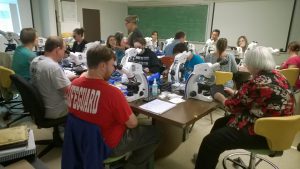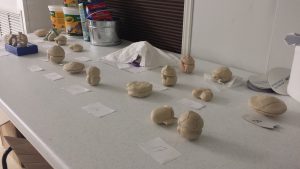Effective monitoring and management of harmful algal blooms (HABs) relies on accurate and timely identification of the species involved. Phytoplankton responsible for HABs varies dramatically in size, shape, pigmentation, toxins, habitat, life history, and ecology. Until recently only Europe offered comprehensive HAB identification training, but NCCOS now provides taxonomic training for a new generation of U.S. managers, scientists and technicians who study HABs.

‘Classical’ algal taxonomy,which relies onmicroscopy to identify and classify algae, is described as a ‘dying art’ due to the lack of dedicated taxonomy programs, retirement of many classical taxonomists, and increased use of new molecular identification methods. Researchers who can microscopically examine a water sample and differentiate the algae within that sample are increasingly rare, but with new HAB species emerging and HAB taxonomy changing rapidly their expertise is crucial.
The NCCOS Monitoring and Event Response for Harmful Algal Blooms ( MERHAB ) program, in partnership with the Provasoli-Guillard National Center for Marine Algae and Microbiota (NCMA), offered the first annual U.S. training course for identifying harmful algae in U.S. marine waters. The course was held August 12-21, 2016 at the Bigelow Laboratory for Ocean Sciences Research and Education campus in East Boothbay, ME. In attendance were 17 students and three instructors, Dr. Karen Steidinger, Dr. Rita Horner, and Dr. Carmelo Tomas. Jennifer Maucher Fuquay, from the NCCOS Phytoplankton Monitoring Network, attended the course and the Center for Coastal Fisheries and Habitat Research provided live HAB cultures.

The course is designed for current local, state, tribal, and federal managers involved in all aspects of HAB monitoring, research and management, but graduate students and others involved in HAB research were also encouraged to apply. Besides microscopic HAB identification, students studied sampling and preservation methods and other approaches to HAB identification. MERHAB will fund the course again in 2017 and 2018, but the project scientists expect the course will become self-sustaining. For course details, visit the Bigelow NCMA webpage here.
For more information, contact Quay.Dortch@noaa.gov.
